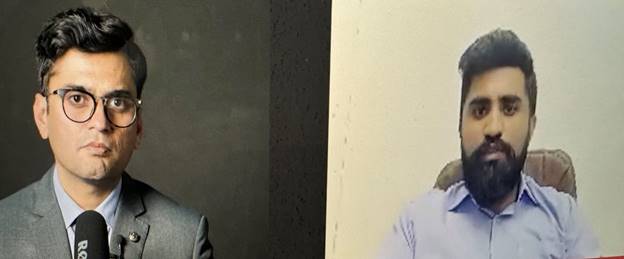
Usama Nizamani and Yousuf M. Farooq
Pakistan’s Economic Problems Discussed on InferTalks
By Elaine Pasquini

Washington: Yousuf M. Farooq, director of research at Chase Securities and director of Elite Lighting (Pvt) Ltd, spoke about solutions to Pakistan’s economic problems with research journalist Usama Nizamani on the April 11, 2024, episode of InferTalks, a digital platform offering news and insights on global issues.
Noting that Pakistan’s economic growth over the past 20 to 25 years has been slow, and while the country’s population is growing at three percent and GDP is growing around 2.3 percent, the living standards of most people are not improving, Farooq said. “The economy is not growing fast enough and people are not getting more prosperous.”
Another problem, Farooq pointed out, is the “constant boom-and-bust cycle” of several years of growth followed by a macroeconomic crisis which causes significant economic disruption and large rounds of rate hikes and inflation. The new International Monetary Fund (IMF) program for Pakistan that Finance Minister Mohammad Aurangzeb discussed with the Fund in Washington at its spring meetings is going to extricate Pakistan from these large boom-and-bust cycles, Farooq predicted. “What the IMF does is that it forces fiscal discipline and a tighter monetary policy.”
Farooq claimed, however, that Pakistan is already exercising better fiscal practices. “Monetary policy has been very tight over the last year and fiscal policy also right now I would say has been significantly tight,” he opined.
A third problem that Pakistan needs to solve is the collection and allocation of resources. Pakistan has always strived to “heavily subsidize people who cannot afford things” and has avoided taxing people who are more affluent, he said. “It’s more of a resource allocation problem and this has been a very big problem for the last 75 years.”
Expanding the tax base is important, especially since Pakistan needs to spend more money on education and healthcare. “You’ve got very large sectors of the economy that aren’t taxed – very large interest groups that do not allow the government to take certain steps, and that has to change,” Farooq continued.
Pakistan’s economy, as well as its politics, runs in cycles. “I think what has happened over the last three or four years is now going to push policymakers and push leadership,” Farooq stated. Because of the crisis that Pakistan has been in over the last several years, things could start to change from here because “people in power now understand that you cannot keep on printing money and not taxing large segments of the economy…and causing large rounds of inflation which then cause instability,” he said.
For the government to not spend significantly more than it collects in taxes is just “common sense,” as is having a reasonable monetary policy, along with expanding the tax base, which Farooq believes Finance Minister Aurangzeb has signaled he will do. “Prudent monetary and fiscal policy will fix most of these problems, but reforms are also important if Pakistan is ever going to get to a sustainable growth.”
In this political environment, it is going to be easier to make changes or reforms because most people have realized there is no way out of this if the situation is not fixed, Farooq argued. The country is in a “significantly better position than it was a year ago…and the government needs to build on that stability.”
Some reforms will not happen quickly, he said, because the government will want to assess the impact of doing certain things such as taxing agriculture in order not to create any major disruption in the agricultural supply.
Farooq pointed out that there are two ways of taxing with respect to the agricultural sector. One way is to tax land, the other is to tax output. And any tax should be proportional between large and small farmers and the provinces must be involved in the process, he insisted. “This will take a lot of time and planning and there will be pushback from powerful people in Parliament.”
With respect to the real estate sector, large portions of real estate are owned by “powerful people in Parliament and there will be pushback there also,” he said. “I think what everyone has to realize is that if Pakistan wants to get out of this situation everyone must pay taxes and everyone in society will be better off.”
On the subject of Pakistan’s external debt, the government needs to “rollover and restructure” some of its debt which would basically mean “taking some long-term debt and slapping out some short-term debt,” Farooq said. Pakistan has a cash flow problem, not a bankruptcy problem, he added. And it needs to improve its credit rating and improve its reputation in the international financial market.
“These boom-bust cycles are what has really disturbed business activity in the country,” Farooq stated. “Pakistan needs stability. I am very optimistic…that we will have that stability and I think that rational decision-making will happen.”
(Elaine Pasquini is a freelance journalist. Her reports appear in the Washington Report on Middle East Affairs and Nuze.Ink.)

